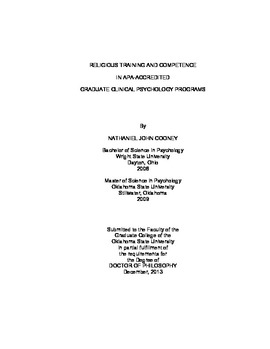| dc.contributor.advisor | Grice, James W. | |
| dc.contributor.author | Cooney, Nathaniel John | |
| dc.date.accessioned | 2015-06-17T20:05:22Z | |
| dc.date.available | 2015-06-17T20:05:22Z | |
| dc.date.issued | 2013-12 | |
| dc.identifier.uri | https://hdl.handle.net/11244/14781 | |
| dc.description.abstract | The 20th century ushered in a new era for psychology that shifted away from philosophical realism in favor of logical positivism and empiricism. Consequently, the field abandoned its deep shared historical roots with religion. Despite that the religious landscape of North America is becoming increasingly diverse, and that decades of research have consistently documented that approximately 90% of North Americans believe in God, psychologists overall report lower levels of religiosity than those they serve. Further, a vast majority of psychologists report a lack of training and competence in religion and its relationship to mental health, despite holding beliefs that religion influences treatment outcomes. While it remains the official policy of the American Psychological Association that graduate clinical psychology programs require formal training and competence in multicultural issues including religion, training directors report that inclusion of this subject-matter is unsystematic and highly variable at best. | |
| dc.description.abstract | Based on these findings, the current investigation examined the attitudes, perceptions, and formal training experiences related to religion, of students in APA-accredited doctoral clinical psychology programs. It further explored students' self-ratings of religious competence, and attempted to conform their competence ratings to their formal training and personal experiences with religion, utilizing Observation Oriented Modeling to analyze the patterns observed in the data. A diverse sample of 250 students from accredited programs across North America participated in this study. Regarding training, two out of three participants reported that religion was given less attention than any other dimension of cultural diversity overall, and one in three reported a training environment that was not respectful of religion. One out of three students reported that their programs did not offer a single course that addressed religion in any context; and only one in four reported that religion was given substantive attention in at least one course. Finally, three out of four students who denied any exposure to religion through graduate coursework nonetheless rated themselves as competent or proficient in this domain. In contrast, personal religious identification did predict competence in three out of five participants. Implications of the current study as well as potential future directions are explored. | |
| dc.format | application/pdf | |
| dc.language | en_US | |
| dc.rights | Copyright is held by the author who has granted the Oklahoma State University Library the non-exclusive right to share this material in its institutional repository. Contact Digital Library Services at lib-dls@okstate.edu or 405-744-9161 for the permission policy on the use, reproduction or distribution of this material. | |
| dc.title | Religious training and competence in APA-accredited graduate clinical psychology programs | |
| dc.contributor.committeeMember | Chaney, John M. | |
| dc.contributor.committeeMember | Sullivan, Maureen A. | |
| dc.contributor.committeeMember | Fuqua, Dale R. | |
| osu.filename | Cooney_okstate_0664D_13017.pdf | |
| osu.accesstype | Open Access | |
| dc.type.genre | Dissertation | |
| dc.type.material | Text | |
| thesis.degree.discipline | Psychology | |
| thesis.degree.grantor | Oklahoma State University | |
